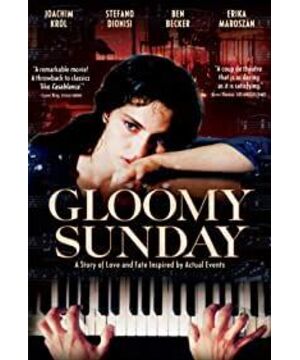In love with the movie "Budapest Love"!
The story takes place before World War II, a restaurant owner, a down-and-out composer and pianist, a German military officer, three men from very different backgrounds all fall in love with the same beautiful woman in Budapest, Hungary. If this play is simply regarded as a four-cornered love, it would be too underestimated the level of the director. Although it is related to Fengyue, the meaning of the movie is definitely not only in Fengyue.
The film runs through the song "Gloomy Sunday" from beginning to end. The sad music seems to bring the chill of fate, and those who are immersed in it seem to be unable to escape the fate of suicide. It wasn't until the restaurant owner decided to leave during the war that he realized the true meaning of it.
In the war, everyone is inevitably involved, and not everyone can "wait for the flood to pass" as the restaurant owner Shabao said. Although he cannot escape the fate of Jews being tortured and persecuted in concentration camps, he Hope is seen in it; the composer who committed suicide, for patriotic dignity, pulled the trigger of his pistol after being forced to play "Melancholy Sunday" for German officers; German officer Hans in the war under the banner of helping Jews , ignorant of conscience to collect money for himself, after cheating the beauty he desperately wanted into bed, he didn't even want to waste an official document to rescue the savior Sha Bao from the cage, but watched him on the journey to the concentration camp.
The pain of the war that haunted the Hungarian people and the grief of the loss of two beloved ones, Irina was the only one who passed the flood silently. She once lived in peace and happiness with the love of two Hungarian men, but for a German man. love, she lost the first two. She just quietly waited for the moment of revenge.
In the middle of the screenwriter, a large amount of space is used to describe the life and love of people during the war. There is little flashback at the beginning and little ink at the end, but it is this simple brush and ink that draws the audience a majestic picture of the Hungarian people's resistance to fascist aggression.
There are no cruel war scenes in the film, only poignant love; there are no frequent gunshots in the film, only beautiful piano music. But it is enough to make the audience feel the cruelty and shock of the war.
Love is about dignity.
(I feel depressed: Why can't several generations of directors in China make such good films?)
View more about Gloomy Sunday reviews











